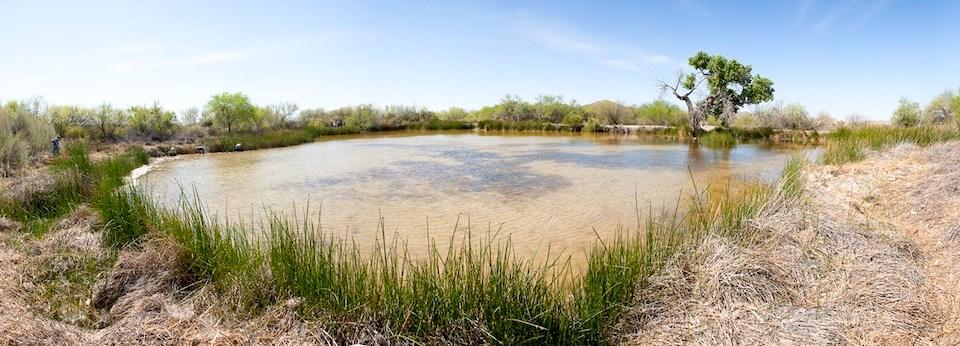
Bone fragments were found near Quitobaquito Springs during preparation for border wall construction/NPS
Editor's note: This updates to clarify that the bones were indeed found in the national monument.
A bone fragment found in Organ Pipe Cactus National Monument in southern Arizona by crews working on constructing a border wall appears to be human, according to National Park Service, which is working to return the piece to tribes affiliated with the monument. The discovery also prompted U.S. Rep. Rául Grijalva to express to the acting secretary of Homeland Security his displeasure with how the agency was "not respecting tribal lands and sacred sites" along the border wall's corridor.
Three bone fragments were found atop the ground during work last spring and fall close by Quitobaquito Springs near the southwestern corner of the monument, Marco De Leon, chief of public affairs for the Park Service's Intermountain Region in Colorado, said Tuesday in an email.
"An osteologist from University of Arizona reviewed the fragments. The fragments are suspected to be of the Classic Hohokam Period," said De Leon. That period dates to between 300 and 1500 AD.
De Leon said Tuesday that the Park Service was working with the U.S. Customs and Border Protection "to voluntarily initiate processes drawn from the Native American Graves Protection and Repatriation Act" to repatriate the bone fragment believed to be human with the Tohono O'odham Nation.
While the Act, adopted in 1990, mandates that federal agencies follow a specific process for returning human remains or cultural items to tribal cultures, Homeland Security received a waiver from following "all legal requirements" in connection with the border wall's construction.
Rep. Grijalva last week wrote Chad F. Wolf, the acting secretary of the Homeland Security Department, to complain about how the agency's intrusions on tribal sites as border wall construction progressed.
The Arizona Democrat acknowledged that the REAL ID Act of 2005 gave the Homeland Security secretary waivers from following many laws in its work, such as tribal consultation, when working on the border wall, he nevertheless argued that "(T)his broad, sweeping authority provisioned to a single member of the executive branch has been highly debated and even deemed unconstitutional."
"... This administration continues to use waiver authority at an unprecedented and irresponsible rate; of the 21 times the waiver has been enacted since 2005, 16 of those instances have occurred in the last two and a half years," the congressman said. "Using this waiver to avoid essential federal government responsibilities to tribes is unnecessary, reckless, and counter to the Department's own policy."
Back in November, the chairman of the Tohono O'odham Nation wrote Border Patrol officials to voice his concerns over construction of the border wall.
"...as the Nation has repeatedly argued in court filings and in other forums, the Nation categorically opposes the barrier construction projects, because they directly harm and threaten both the lands currently reserved for the Nation and its ancestral lands that extend along the international boundary in Arizona...," wrote Ned Norris, Jr.
Later in the letter he noted that "the construction activities in Organ Pipe Cactus National Monument already have resulted in the inadvertent discovery of human remains that would otherwise be protected by (the Native American Graves Protection and Repatriation Act)."
The bone fragments were found near Quitobaquito Spring, "both within the 60-foot Roosevelt Reservation (an area within the monument) and outside of that reservation," the tribal chairman wrote.
Calls Tuesday to Norris as well as Scott Stonum, Organ Pipe's superintendent, for additional details were not immediately returned.
Last September a National Park Service report said construction of the border wall very likely would destroy archaeological resources in the monument.
A quick field survey along 11 miles of the national monument near where the wall was proposed to be built identified five archaeological sites, and left the archaeologists of the mind that "significant, presently-unrecorded surface-level and buried archaeological deposits persist across the project (are), and we must assume that all such unrecorded deposits will be destroyed over the course of ensuing border wall construction."
The survey was done between June 24 and June 28 along the monument's southern boundary. That quick reconnaissance identified five sites, two that the Park Service archaeologists believe qualified for National Register of Historic Places listing.
According to that report, the Park Service had been told that once the construction began, the work would occupy the 60-foot wide swath of what's known as the "Roosevelt Reservation" in the monument. All told, the work could affect 218 acres within Organ Pipe, it added.
"...the NPS regards the entire 18.3 m- (60-foot-) wide Roosevelt Reservation as an area of great concern, whose cultural and natural resources are imperiled," wrote the report's author, Dr. Andrew Veech, who works for the Park Service's Intermountain Region Archaeology Program.

 Support Essential Coverage of Essential Places
Support Essential Coverage of Essential Places







Comments
This makes me sick.
This land is sacred to this Indian Tribe ...It is THEIR land...We have had a treaty with them since 1937! What Trump is doing is destroying their home and is disgusting! He doesn't care as long as he buillds his stupid and really ugly wall!